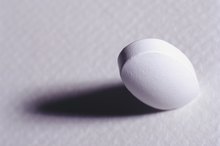Side Effects of Calcium Hydroxyapatite 1000 mg
Your bones remain strong and healthy due to the presence of appropriate levels of calcium in your blood. Consuming yogurt, milk, cheese, salmon and spinach can help ensure your body receives the recommended daily intake of 1000 to 1200 mg of calcium adults require, the Office of Dietary Supplements reports. Your doctor may also recommend that you take a calcium supplement, such as calcium hydroxyapatite, if you don't consume enough of this mineral from your diet. Talk with your physician about the side effects of calcium hydroxyapatite before beginning treatment with this type of calcium supplement.
Stomach Discomfort
You may experience stomach discomfort while receiving treatment with calcium hydroxyapatite supplements. Excess gas may accumulate in your stomach, which can lead to flatulence or burping. Gassiness may also cause stomach fullness and may contribute to a temporary loss of appetite. If you consume too much calcium, you may be at risk of developing hypercalcemia. This condition, which is characterized by high blood levels of calcium, may cause additional upset stomach side effects including nausea, vomiting or constipation. Seek care from your medical provider if you exhibit any of these side effects while taking calcium hydroxyapatite.
- You may experience stomach discomfort while receiving treatment with calcium hydroxyapatite supplements.
- This condition, which is characterized by high blood levels of calcium, may cause additional upset stomach side effects including nausea, vomiting or constipation.
Flushing or Sweating
Viactiv Calcium Chews Side Effects
Learn More
You may experience unusual skin reactions as a side effect of taking this type of calcium supplement. The skin across your face or body may appear red and may be warm to the touch. Excessive sweating may also occur, MayoClinic.com reports, which may cause your skin to feel warm or moist. If these side effects persist or become severe, consult your doctor for further evaluation and care.
- You may experience unusual skin reactions as a side effect of taking this type of calcium supplement.
Dry Mouth or Frequent Urination
Dry mouth may occur as a side effect of consuming too much calcium hydroxyapatite. Prolonged treatment with a daily 1000-mg dose of this calcium supplement may result in thick, sticky saliva, throat irritation and increased thirst. You may also urinate more frequently than usual. Talk with your physician if these side effects do not resolve or occur in conjunction with urination pain or unintended weight loss. Dry mouth and frequent urination may also be signs of alternate health issues, such as high blood sugar or a bladder infection.
- Dry mouth may occur as a side effect of consuming too much calcium hydroxyapatite.
- Dry mouth and frequent urination may also be signs of alternate health issues, such as high blood sugar or a bladder infection.
Headache or Fatigue
Calcium Hydroxide Side Effects
Learn More
High blood levels of calcium caused by taking high doses of calcium hydroxyapatite may lead to headache or fatigue. These side effects may disrupt your ability to remain active or focused during your normal daily activities.
Related Articles
References
- Linus Pauling Institute at Oregon State University: Calcium
- Office of Dietary Supplements: Calcium
- Bolland, MJ, et. al. Calcium supplements with or without vitamin D and risk of cardiovascular events: reanalysis of the Women's Health Initiative limited access dataset and meta-analysis. BMJ. 2011 Apr 19;342:d2040. DOI: 10.1136/bmj.d2040
- Reid IR. The roles of calcium and vitamin D in the prevention of osteoporosis. Endocrinol Metab Clin North Am. 27: 389-398. DOI:10.1016/s0889-8529(05)70011-6
- Chen M, Pan A, Malik VS, Hu FB. Effects of dairy intake on body weight and fat: a meta-analysis of randomized controlled trials. The American Journal of Clinical Nutrition. 2012;96(4):735-747. DOI:10.3945/ajcn.112.037119
- Williams V, Rawat A, Vignesh P, Shandilya JK, Gupta A, Singh S. Fc-gamma receptor expression profile in a North-Indian cohort of pediatric-onset systemic lupus erythematosus: An observational study. Int J Rheum Dis. 2019;22(3):449-457. doi: 10.6061/clinics/2012(07)22
- Reid IR, Birstow SM, Bolland MJ. Calcium and Cardiovascular Disease. Endocrinol Metab (Seoul). 2017;32(3):339-349. doi: 10.3803/EnM.2017.32.3.339
- MedlinePlus Medical Encyclopedia, "Milk-alkali syndrome"
- Bolland MJ, Grey A, Avenell A, Gamble GD, Reid IR. Calcium supplements with or without vitamin D and risk of cardiovascular events: reanalysis of the Women’s Health Initiative limited access dataset and meta-analysis. BMJ. d2040-d2040. DOI:10.1136/bmj.d2040
- Chan Soo Shin, et. al. Endocrinol Metab (Seoul). 30(1): 27–34. DOI: 10.3803/EnM.2015.30.1.27
- Linus Pauling Institute. Calcium.
- National Institute of Health Office of Dietary Supplements. Calcium.
- Weingarten MAMA, Zalmanovici Trestioreanu A, Yaphe J. Dietary calcium supplementation for preventing colorectal cancer and adenomatous polyps. Cochrane Database of Systematic Reviews 2008, Issue 1. Art. No.: CD003548. DOI: 10.1002/14651858.CD003548.pub4
- Zemel, MB et. al. Calcium and dairy acceleration of weight and fat loss during energy restriction in obese adults. Obes Res. 2004 Apr;12(4):582-90. DOI: 10.1038/oby.2004.67
Writer Bio
Rae Uddin has worked as a freelance writer and editor since 2004. She specializes in scientific journalism and medical and technical writing. Her work has appeared in various online publications. Uddin earned her Master of Science in integrated biomedical sciences with an emphasis in molecular and cellular biochemistry from the University of Kentucky College of Medicine.









